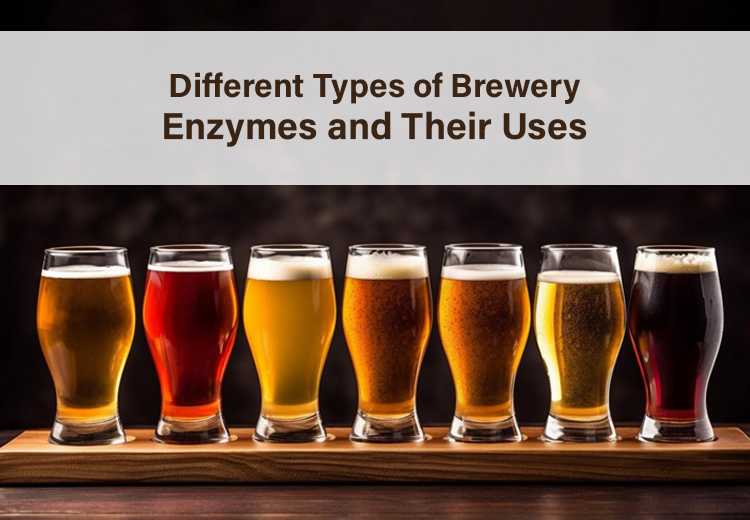Different Types of Brewery Enzymes and Their Uses


As enzymes work as catalysts to transform and insert components into the beloved beverage that we all enjoy, they are crucial to the intricate and inventive process of manufacturing beer. Enzymes have a transforming role in brewing operations. We explore the rich realm of brewery enzymes in this post and learn about their importance in the brewing process. We’ll examine their many roles, which range from affecting flavours to dissecting intricate chemicals. Let’s start!
Table of Contents
Toggle1. What Are Brewing Enzymes and What Do They Do?
Imagine brewing enzymes as tiny conductors, helping all the ingredients work together like a band. They act like little helpers, turning simple ingredients into the tasty flavors we enjoy in beer. Working behind the scenes, they break down ingredients and speed up brewing. By bringing together grains, water, hops, and yeast, they create the golden drink we know. Now, let’s explore the enzymes used in brewing
2. Enzymes Used In the Brewing Process
- Amylase: It turns starches into sugars for fermentation. Think of it as the wizard converting barley starch into the sweet magic of beer.
- Protease: Converts proteins into amino acids, reducing haziness for a crystal-clear brew.
- Beta-Glucanase: Breaks down beta-glucans, ensuring a clear and smooth drink without filtration hiccups.
- Phytase: Releases phosphates, giving yeast the boost it needs for top-notch metabolism.
- Pectinase: Degrades fruit-based pectin, preventing haze and enhancing fruity goodness in beers.
All above are brewing industry enzymes. To make brewing even better, breweries sometimes add extra amylase enzymes to help grains release more sugars for fermentation. This gives them more control over the process, especially when malt quality changes. With this smart step, every batch of beer turns out just right
Extra enzymes give brewers a secret ingredient for success, adding flexibility and flair to different brewing styles. By mixing and matching enzymes, they can create unique flavors that bring out the best in every beer. This is especially exciting in the creative world of craft brewing, where bold ideas and happy accidents lead to the next great brew
3. Joining the Enzyme Symphony: Commercial Enzymes
Think of commercial enzymes as guest musicians helping the brewing process sound even better. These special enzymes come from careful fermentation and are made to improve quality and efficiency. They help brewers adjust recipes and have more control, making sure each batch of beer turns out just right
Over the past two years, numerous breweries have implemented initiatives to enhance efficiency and optimize the utilization of raw materials. A significant focus has been placed on incorporating commercial enzymes into the brewing process to reduce production time, boost capacity, and explore alternative raw materials in lieu of malt.
One notable practice involves substituting a portion of malt with barley. This approach has gained popularity because using barley alongside commercial enzymes yields brewage of comparable quality to that achieved with malt.
4. Selecting the Right Enzyme
To craft your brewing masterpiece, choose your enzymes wisely:
- Brewing Goals: Define your brewing goals – flavour, efficiency, or clarity.
- Malt Composition: Understand your malt’s diastatic strength for optimal enzyme use.
- Beer Style: Different beers, different enzymes. Match them for the perfect brew.
- Brewing Conditions: Align temperature, pH, and mash time with the optimal enzyme requirements.
- Supplier Insights: Contact enzyme suppliers for valuable usage tips and compatibility information.
Enzymes play the crucial role of conductors, ensuring each element harmonizes perfectly in the brewing process. Grasping their varieties and functions gives brewers the tools to craft exceptional beer. Whether you’re a seasoned pro or just love homebrewing, delving into the science of brewery enzymes is the gateway to mastering the brewing art. Here’s to the enchanting realm of enzymes and the delightful brews they contribute to!
In India, Ultreze Enzymes is the leading producer, distributor, and exporter of brewing enzymes. We genuinely think that premium enzymes are essential to the brewing sector. Your hunt for excellent brewing enzymes for your brewery is over, We are here for you. Yes, together we can make a difference!

